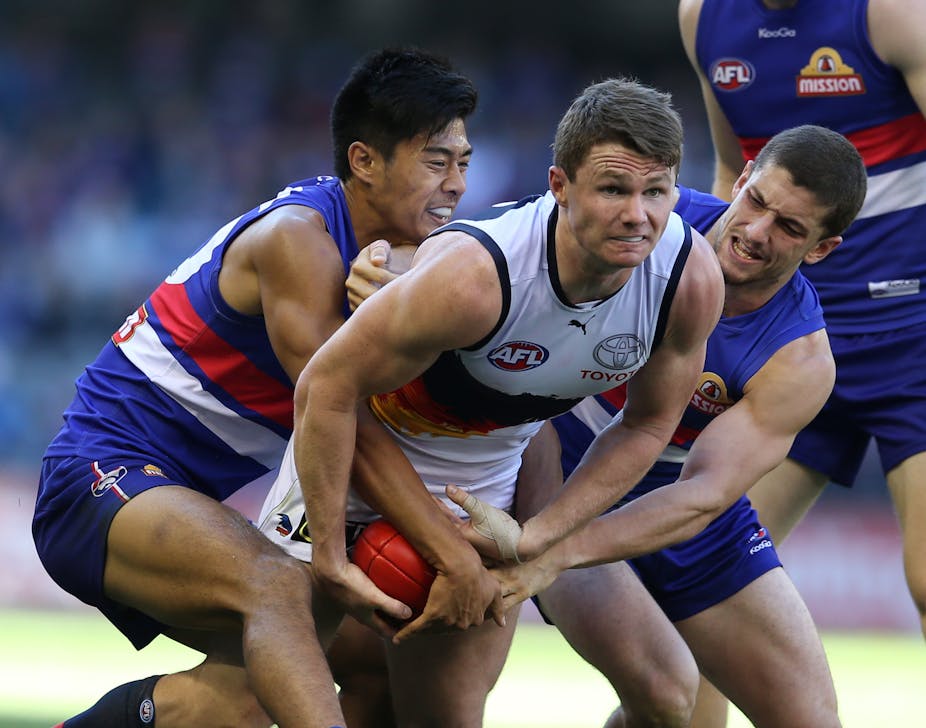Is Australian football, the “people’s game” in its traditional motto, under threat? Will it remain Australia’s number one sport in its bicentenary year 2058? Or will the AFL’s greedy ticket pricing and win-at-all-costs coaches make the Australian game an unwatched traditional sport in a global world?
The problems – and the solutions – are found at the top: AFL HQ, which today appointed an insider, Gillon McLachlan, as its next CEO, and the coaches.
Popular alienation off the field grew from the less-than-edifying spectacle of the Essendon peptides saga. The public was bombarded with accusations of evil “scientists”, narcissistic coaches, disposable pawns, bullying AFL bosses, media artillery on each side and an unsafe workplace for young men.
While AFL HQ pays inordinate bonuses for “metrics” (TV and other revenues) – outgoing CEO Andrew Demetriou received a A$2million bonus last year – AFL-brand corporate capitalism for the “industry” has no place for other measures: the degree of member and supporter alienation.
Ticketing kills the walk-up tradition
Now, “variable pricing” and floating time and day schedules enrage footy followers. “Seat revenue maximisation”, the airlines’ term, is actually price gouging, despite a few reduced seat prices. Fans who cough up several hundred dollars for memberships are stung with extra seat booking fees from $7.50 to over $30.
The great tradition of footy, of the walk-up, of “let’s go to the footy today”, has been kiboshed by an American revenue-maximising system applied to matches of little consequence called “B” matches, with bigger stings for “A” matches. Footy has lost its spontaneity.
As population grows, and every Melbourne event is under pressure, the AFL has exploited the gap between supply and demand, further exacerbating growing social class divides. Except it hasn’t worked. Crowds are down as supporters have voted with their feet.
While planes are around 80-90% economy class, as not all punters can afford a premium, the AFL wants more and more to pay extra. The AFL, once proud of keeping ticket price rises at CPI, has abandoned its egalitarian aspirations.
Coaching tactics clog up play
On the field, the experts finally agree with Hanrahan, that old pessimist. Football is at risk of being “rooned”. Despite the exceptions – Hawthorn’s skill, Geelong’s “run and gun” and the passion of Port Adelaide – the game is not what it used to be.
While the AFL Commission asks for input on the non-negotiable fundamentals of Australian football, the current reality is that all coaches move all of their players to inside the 50-metre line when in defence.
When teams are not playing rolling mauls, ricochet football, semi-tackle after tackle, ineffective hit-on or handpass for several minutes, they revert to the other game: keepings-off. Moving the ball across the ground and keeping possession, silky kicking skills are unfortunately not complemented by contested marks.
While the game has changed endlessly (once 20, then 17 players and no reserves, then a 19th, and then a 20th man for injuries, now four interchange, and VFA 16-a-side), footy should have one non-negotiable: that the game is not played in only one small section of the ground. That is the one “KPI” that supporters want. It is the coaches, not the rule-makers, who are “mucking around with the game”.
Dump variable ticketing, fix the rules
The coaches’ revolution must be challenged, as several coaches turned gamekeepers now acknowledge. Observers, of greater or lesser footy fame, remarked on this. Even hardened radio commentators agonise about the aesthetics of the game, while former Carlton player Ted Hopkins simply called it “Ugby”, a cross between rugby and ugly.
Richmond legend and media commentator Kevin Bartlett blames it on the interchange. In my history and futurology of the game, Australian Football: The People’s Game 1958-2058, I called it “tackleball”, arguing for a minimum number of players inside each 50-metre line, a view endorsed by Leigh Matthews. Garry Lyon and Kevin Sheedy, condemning “the stupid things that coaches bring in”, and Rodney Eade, who pioneered [flooding](http://en.wikipedia.org/wiki/Flooding_(Australian_football), have joined the chorus.
While some coaches tout the virtues of “stoppage ball” or “boundary-line football” as defence wins finals, the fans don’t get it. The break-out from a maul can be exciting, but if we wanted to watch rolling mauls we’d go to the rugby. Or if we preferred endless multiple tackles, with increased injury risk, we’d choose rugby league. Nor do we want to watch “keepings-off”, except in the gripping last minutes before the final siren.
The game has become overcharged. Weights, bicycles, running machines and real sports scientists have created a battle of runners and tacklers. In the footy arms race, chessmaster coaches move players with greater aerobic ability and endurance around the board (“playing their role”, “keeping our structures”) to create this mess. The interchange is only one of the factors making the on-field mess possible.
The solution to both on and off-field problems has not been found at AFL HQ, or “happy days” as Terry Wallace once called it. There, all is well and it is the critics who “have got a problem”. Or, last week, “we haven’t explained variable ticketing adequately”. Unlike the umpires and players, AFL HQ never makes a mistake.
Solutions are needed, and should be high on McLachlan’s agenda when he assumes the CEO role. Abandoning variable price ticketing as a disaster, as requested by the new AFL Fans Association, should be the first step. On the field, only rule changes can stem the coaches’ flooding tides.

